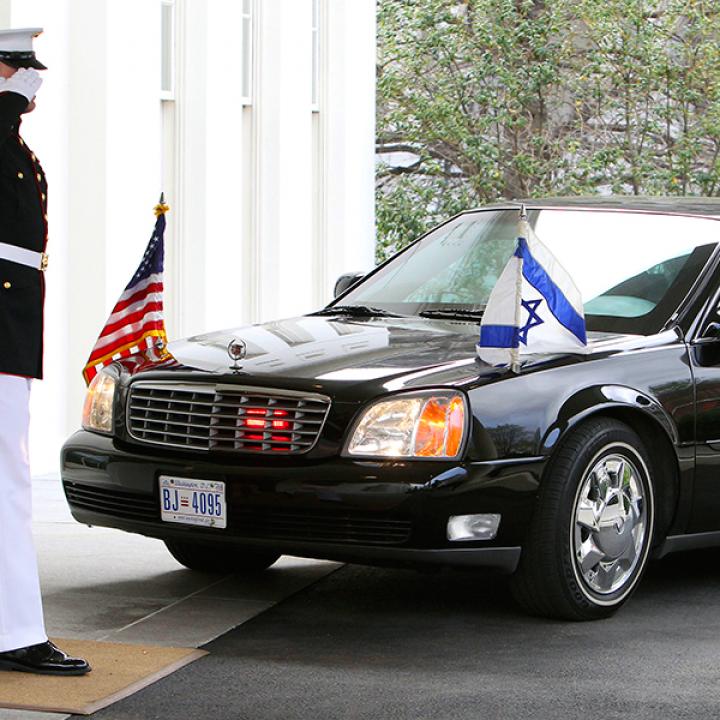
- Policy Analysis
- Policy Forum
Doomed to Succeed: The U.S.-Israel Relationship from Truman to Obama

An in-depth conversation with two former senior U.S. officials on the past, present, and future of the U.S.-Israel alliance.
On October 26, The Washington Institute held a Policy Forum to celebrate the publication of a new book by Ambassador Dennis Ross, the Institute's counselor and William Davidson Distinguished Fellow. Below is a rapporteur's summary of his remarks and video of the full event. Former national security advisor Thomas Donilon also spoke at the forum; download the PDF to read excerpts from a transcript of his remarks.
AMBASSADOR ROSS
The same dynamics, tensions, and arguments currently present in the U.S.-Israel relationship can be found in prior administrations going back to Israel's founding. Although the relationship has proven to be very durable, the proper lessons from its history are rarely examined. Both countries need to reassess their core assumptions, but this rarely happens in the policymaking process.
Regarding America's policy record toward Israel, past administrations have tended to take one of two different approaches. On the one hand, Presidents Truman, Reagan, Clinton, and George W. Bush emphasized shared values between the two countries. On the other hand, Presidents Eisenhower, Nixon, and George H. W. Bush viewed the relationship as part of a zero-sum dynamic subordinate to U.S. relations with Arab allies. Some administrations incorrectly assumed that certain positive actions toward Israel could damage U.S. relations with Arab states, but the actual behavior of these states was driven by other interests: namely, security, survivability, and the reliability of their partnerships with the United States.
Today, President Obama's approach to Israel incorporates elements from both sides of this policy spectrum. He views the security relationship separately from political matters, but he also believes that his commitment to Israel's security allows him to be openly critical when the country is not, in his view, living up to its values. Historically, however, whenever presidents have decided to distance themselves from Israel in order to influence its decisionmaking, they have not gained the desired outcome. While President Obama did not believe Israel should be isolated, he did feel that distancing was appropriate, and he did not see the value of developing a positive incentive structure. The relationship would have been more productive if he had placed the settlement issue in context, visited Israel after his 2009 Cairo speech, and done more to establish a connection with the Israeli public.
Trust and understanding between U.S. and Israeli leaders is pivotal. The countries' mutual interests are much greater than their differences, and this fact needs to be consistently demonstrated, especially when they disagree over the best way to reach a shared objective such as preventing a nuclear Iran. There should not be any surprises in the relationship, and if disagreements are properly handled, there will not be any daylight either.
Over the next fifteen years, the United States and Israel need to work together to ensure proper implementation of the Joint Comprehensive Plan of Action, confront Iran's regional behavior, and prepare for the JCPOA's sunset clauses. Despite differences between the Obama administration and Prime Minister Netanyahu, the two countries now have more reasons to work together, not fewer. Israel faces new threats from Syria, Russia, and ISIS that further complicate the preexisting threat from Hezbollah and Iran. The United States needs to create and articulate a comprehensive strategy to address Syria and ISIS. The current U.S. approach risks adding to the jihadist group's appeal as a guarantor of Sunni security, particularly if U.S. forces are attacking ISIS while the Russians are attacking the non-ISIS opposition. The president and prime minister should create a joint committee to address current and future threats to Israel and reinforce the relationship. At a time when the state system in the region is under fire, both countries need to increase cooperation and communication.
During the final year of President Obama's term, the administration should also finalize a new memorandum of understanding with Israel. While there is no appetite for a major peace initiative from the White House, it is important to avoid an all-or-nothing approach to the peace process, because this dichotomy leads to political vacuums enabled by U.S. inaction. At the same time, another failed initiative could further harm U.S. interests in the region, so the Obama administration should focus on restoring security and trust between all parties. It might be necessary to involve Arab states because the current Palestinian leadership is extremely weak. Helpful parallel steps could include defining the current status quo at al-Aqsa Mosque, convincing Israel to cease settlement construction outside the blocs, and convincing the Palestinians to put Israel on a map. Any true supporter of Israel and the bilateral relationship needs to see the consequences of a one-state outcome and preserve Israel as a nonpartisan issue.
This summary was prepared by Patrick Schmidt.





